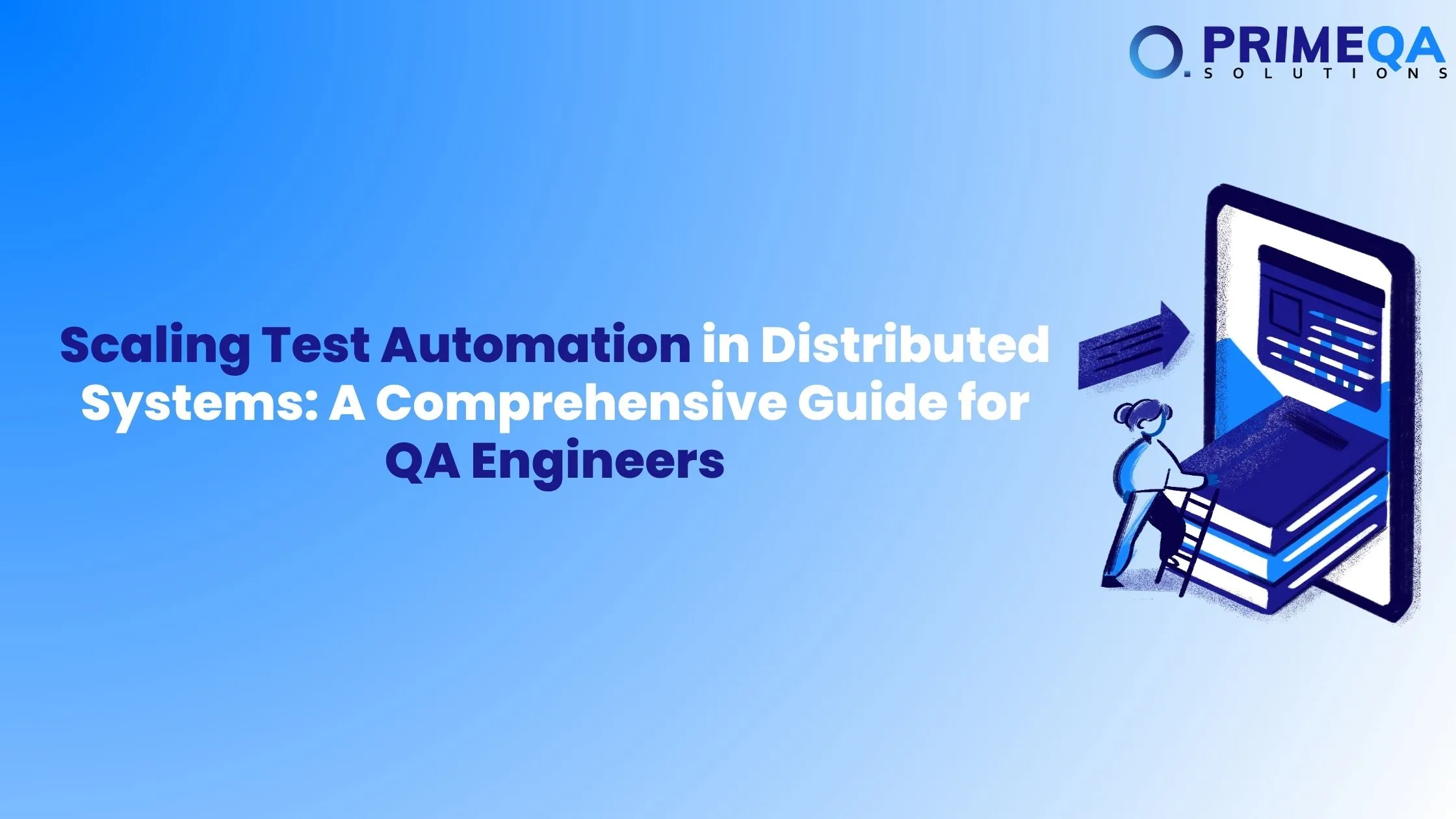Distributed systems are at the core of modern applications, enabling scalability, flexibility, and resilience. However, these complex architectures present unique challenges, particularly when it comes to test automation. At PrimeQA Solutions, a leading software testing company in Ahmedabad, we specialize in scalable, reliable, and efficient solutions for software testing distributed systems.
This blog offers a step-by-step guide to scaling test automation for QA engineers, addressing common challenges, solutions, and strategies for successful automation testing.
Challenges in Scaling Test Automation for Distributed Systems
- Complex Architectures Distributed systems often involve multiple interconnected components like microservices. Testing such architectures requires tools and frameworks designed for automated testing in a microservices architecture.
- Data Consistency Across Nodes Ensuring data synchronization across various nodes can be a daunting task, especially in high-traffic environments. Testing for consistency often demands rigorous test planning and execution.
- Fault Tolerance and Recovery Distributed systems must handle failures gracefully. Testing for fault tolerance and recovery involves simulating outages and monitoring system responses.
- Scalability Testing Under Load Testing distributed systems for scalability under high traffic is crucial. This requires robust tools for load balancing and fault detection in test automation to ensure seamless performance.
- Continuous Integration Complexity Ensuring that all services work cohesively in CI/CD pipelines often results in unpredictable integration issues that need immediate resolution.
Solutions to Overcome Test Automation Challenges in Distributed Systems
- Step-by-Step Guide to Scaling Test Automation for QA Engineers
- Understand the Architecture: Map out how various system components interact to identify potential testing bottlenecks.
- Select the Right Frameworks: Use tools like Playwright, Selenium Grid, or Apache JMeter that are specifically suited for distributed environments.
- Focus on Modularization: Break test cases into modular components to ensure better maintainability and scalability.
- Implement Parallel Execution: Optimize test cycles by running tests concurrently across different environments.
- Automated Testing in Microservices Architecture
- Use API testing tools such as Postman or RestAssured to verify the interactions between microservices.
- Employ service virtualization techniques like mocks and stubs to isolate components and test them independently.
- Validate system workflows through comprehensive end-to-end testing.
- Continuous Integration and Testing for Distributed Software
- Integrate automated tests into CI/CD pipelines using tools like Jenkins, GitLab CI, or CircleCI.
- Continuously monitor test outcomes to detect and resolve failures promptly.
- Automate rollback mechanisms for smoother issue resolution.
- Load Balancing and Fault Detection in Test Automation
- Use tools like Gatling or Apache JMeter to simulate varying user loads.
- Perform health checks to ensure system components remain operational during load testing.
- Test failover capabilities to ensure uninterrupted performance during component failures.
How to Scale Test Automation in Distributed Systems Efficiently
- Adopt Containerization Software testing tools like Docker and Kubernetes enable the creation of isolated, scalable, and reproducible test environments.
- Leverage Cloud Infrastructure Cloud platforms such as AWS, Azure, or Google Cloud provide on-demand resources, making it easier to scale testing without hardware limitations.
- Dynamic Test Orchestration Frameworks like Selenium Grid and Playwright Test support dynamic resource allocation, ensuring maximum efficiency in distributed test scenarios.
- Monitor Test Performance Leverage monitoring tools like Grafana and Prometheus to analyze test execution metrics and optimize for faster feedback cycles.
Why Choose PrimeQA Solutions for Test Automation?
As a trusted QA company in Ahmedabad, PrimeQA Solutions is equipped to help businesses navigate the complexities of distributed systems testing. Our expertise includes:
- Automated testing in microservices architecture
- Scalable solutions for load balancing and fault detection
- Seamless integration of testing into CI/CD pipelines
With our tailored approach and cutting-edge tools, we empower clients to deliver high-quality software with reduced time-to-market.
Final Thoughts
Scaling test automation for distributed systems is essential for ensuring the reliability and performance of modern applications. By leveraging best practices and advanced tools, QA engineers can overcome challenges and deliver seamless user experiences.
At PrimeQA Solutions, we are committed to enabling efficient and scalable test automation strategies for businesses of all sizes. Contact us today to learn how our expertise as a software testing company in Ahmedabad can transform your testing processes.
FAQ
What are the common challenges in scaling test automation for distributed systems?
Distributed systems face challenges such as handling complex architectures, ensuring data consistency across nodes, testing for fault tolerance and recovery, and managing scalability under high traffic. These challenges require robust test automation strategies and tools like Playwright and Selenium Grid to ensure efficient testing.
How can automated testing in microservices architecture improve scalability?
Automated testing in microservices architecture uses tools like Postman and RestAssured for API testing, along with service virtualization techniques like mocks and stubs. This ensures independent testing of components, reduces dependencies, and enhances scalability.
Why is continuous integration important for test automation in distributed systems?
Continuous integration ensures that multiple services in a distributed system work cohesively. Automated tests integrated into CI/CD pipelines help detect issues early, optimize workflows, and support smooth rollbacks, which is essential for distributed software.
How do tools like Docker and Kubernetes enhance test automation?
Containerization with Docker and Kubernetes creates isolated, scalable, and reproducible test environments. These tools simplify resource management, making it easier to efficiently scale test automation for distributed systems.
Why choose PrimeQA Solutions for distributed systems testing?
PrimeQA Solutions, a leading software testing company in Ahmedabad, provides tailored solutions for distributed systems. Our expertise includes automated testing in microservices architecture, load balancing, fault detection, and seamless CI/CD integration, empowering businesses to deliver reliable and scalable applications.







